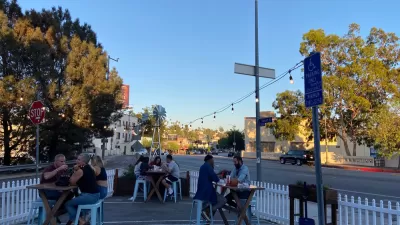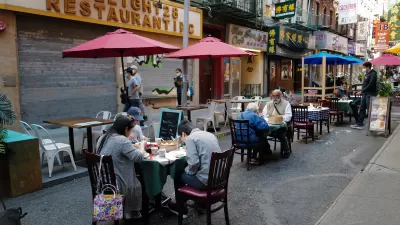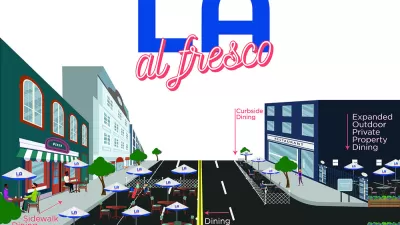Restaurant owners say the new regulations proposed by the city for installing and maintaining outdoor dining areas would put them out of reach for many businesses.

During the pandemic, the Al Fresco Dining program launched by Los Angeles that allowed restaurants to install outdoor dining patios in front of their businesses kept many of them afloat, with more than 2,500 businesses taking advantage of the program. As Jenn Harris explains in the Los Angeles Times, “The program bypassed the usual paperwork, bureaucracy, fees and months of approval that accompany the city permitting process, allowing restaurants to apply for free permits online in minutes and to set up dining areas on private property, on sidewalks, along curbsides and in the street.”
The program is now under threat as city officials outline regulations for the future. While city planners say the streamlined program was always intended to be temporary, restaurant owners say they are still barely beginning to work their way out from under the debt they accrued during the pandemic at a time when ingredient and labor costs are soaring.
“Now, the city’s proposed ordinance would revert to confusing red tape that could cost restaurants tens of thousands of dollars and put those who can’t afford the additional costs out of business for good.” The proposed ordinance would make the process cost tens of thousands and potentially require a zoning variance. “In addition to the new permits, the proposed ordinance includes restrictions such as the height of a barrier wall, the number of parking spaces that could be turned into outdoor dining areas and allowances for private events.”
Harris also points out that the ordinance only applies to zoning. Restaurants would likely have to apply for additional permits from the Department of Building and Safety and the Department of Transportation.
FULL STORY: ‘Sucker punch’ proposal could doom outdoor dining

Study: Maui’s Plan to Convert Vacation Rentals to Long-Term Housing Could Cause Nearly $1 Billion Economic Loss
The plan would reduce visitor accommodation by 25% resulting in 1,900 jobs lost.

Alabama: Trump Terminates Settlements for Black Communities Harmed By Raw Sewage
Trump deemed the landmark civil rights agreement “illegal DEI and environmental justice policy.”

Why Should We Subsidize Public Transportation?
Many public transit agencies face financial stress due to rising costs, declining fare revenue, and declining subsidies. Transit advocates must provide a strong business case for increasing public transit funding.

Paris Bike Boom Leads to Steep Drop in Air Pollution
The French city’s air quality has improved dramatically in the past 20 years, coinciding with a growth in cycling.

Why Housing Costs More to Build in California Than in Texas
Hard costs like labor and materials combined with ‘soft’ costs such as permitting make building in the San Francisco Bay Area almost three times as costly as in Texas cities.

San Diego County Sees a Rise in Urban Coyotes
San Diego County experiences a rise in urban coyotes, as sightings become prevalent throughout its urban neighbourhoods and surrounding areas.
Urban Design for Planners 1: Software Tools
This six-course series explores essential urban design concepts using open source software and equips planners with the tools they need to participate fully in the urban design process.
Planning for Universal Design
Learn the tools for implementing Universal Design in planning regulations.
Smith Gee Studio
Alamo Area Metropolitan Planning Organization
City of Santa Clarita
Institute for Housing and Urban Development Studies (IHS)
City of Grandview
Harvard GSD Executive Education
Toledo-Lucas County Plan Commissions
Salt Lake City
NYU Wagner Graduate School of Public Service





























